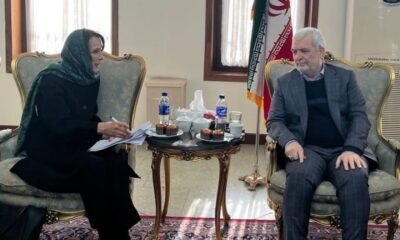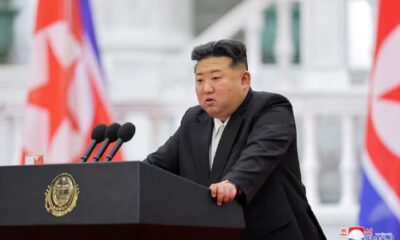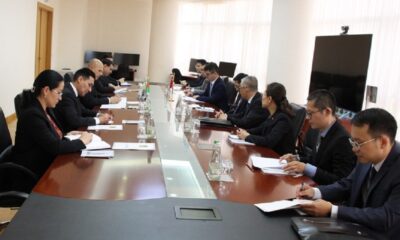World
N.Korea resumes missile tests with first launch in a month
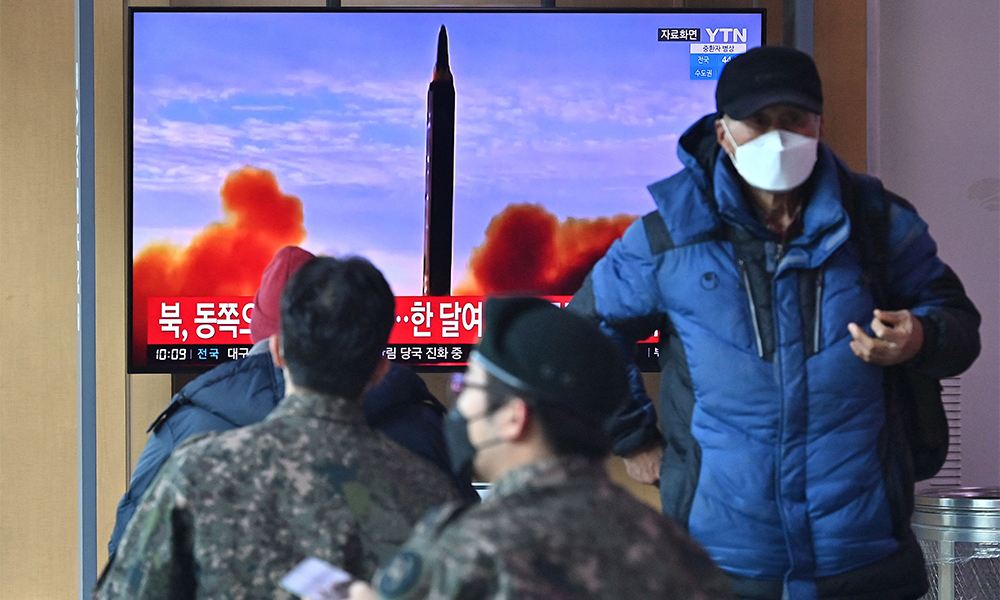
North Korea fired what could be a ballistic missile on Sunday, military officials in South Korea and Japan said, in what would be the first test since the nuclear-armed country conducted a record number of launches in January, Reuters reported.
South Korea's Joint Chiefs of Staff reported that North Korea had fired a suspected ballistic missile toward the sea off its east coast from a location near Sunan, where Pyongyang's international airport is located.
According to Reuters the airport has been the site of missile tests, including a pair of short-range ballistic missiles fired on Jan. 16.
Sunday's missile flew around to a maximum altitude of around 620 km (390 miles), to a range of 300 km (190 miles), JCS said.
Analysts said the flight data didn't closely match earlier tests, and suggested it could be a medium-range ballistic missile fired on a "lofted" trajectory.
"There have been frequent launches since the start of the year, and North Korea is continuing to rapidly develop ballistic missile technology," Japan's Defense Minister Nobuo Kishi said in a televised statement. North Korea was threatening the security of Japan, the region and the international community, he said.
The United States condemned the latest launch and called on North Korea to cease destabilising acts, but said the test did not pose an immediate threat, said the U.S. military's Indo-Pacific Command, read the report.
North Korea's last test was on Jan. 30, when it fired a Hwasong-12 intermediate range ballistic missile.
The largest weapon test-fired since 2017, the Hwasong-12 was reported to have flown to an altitude of about 2,000 km (1,200 miles) and range of 800 km (500 miles). That capped a record month of mostly short-range missile launches in January.
LAUNCH AMID S.KOREA ELECTION, 'PUTIN'S WAR'
Sunday's launch came less than two weeks ahead of South Korea's March 9 presidential election, amid fears by some in Seoul and Tokyo that Pyongyang may push ahead with missile development while international attention is focused on Russia's invasion of Ukraine.
"This launch comes as the international community is responding to the Russian invasion of Ukraine, and if North Korea is making use of that situation, it is something we cannot tolerate," Kishi said.
South Korea's National Security Council convened an emergency meeting to discuss the launch, which it called "regrettable", according to a statement from the presidential Blue House, Reuters reported.
"Launching a ballistic missile at a time when the world is making efforts to resolve the Ukraine war is never desirable for peace and stability in the world, the region, and on the Korean Peninsula," the statement said.
The leading conservative candidate, Yoon Suk-Yeol, warned last week that North Korea could see the Ukraine crisis as "an opportunity for launching its own provocation."
Candidates and analysts have noted, however, that even before the invasion North Korean leader Kim Jong Un was overseeing an increase in missile tests as talks with the United States and its allies remain stalled.
"Putin’s War shapes almost all geopolitics right now, and should factor somewhere in Kim’s calculus — but even 'taking advantage of distraction' seems to presume too much, since (North Korea) was already testing aggressively before the war," John Delury, a professor at South Korea's Yonsei University, said on Twitter.
OLYMPIC LULL IN TESTING
China's representative on the Korean Peninsula, Liu Xiaoming, said on Sunday he spoke by phone with his U.S. counterpart, Sung Kim, and urged the United States to address North Korea's legitimate and reasonable concerns with greater attention, so as to create conditions for restarting dialogue.
"I pointed out that, under current situation, relevant parties should be cautious in words and actions, avoid stimulating each other, so as to prevent escalation of tension on the Korean Peninsula," Liu said on Twitter, without specifying when the phone conversation took place and without mentioning the latest test.
North Korea, which has close ties to China, did not test any missiles during the Beijing Olympics in February. The 2022 Winter Paralympics begin in Beijing on Friday.
Complaining of unrelenting "hostile policies" from the United States, North Korea has suggested it could resume testing its longer-range missiles or even nuclear weapons.
Pyongyang has an ambitious schedule of military modernisation, and the Kim regime’s strength and legitimacy have become tied to testing ever-better missiles, said Leif-Eric Easley, a professor at Ewha University in Seoul.
"North Korea is not going to do anyone the favour of staying quiet while the world deals with Russia’s aggression against Ukraine," he said.
Washington says it is open to talks with North Korea without preconditions, but Pyongyang has so far rejected those overtures as insincere, Reuters reported.
North Korea's ballistic missile launches are banned by United Nations Security Council resolutions, which have imposed sanctions on the country over its missile and nuclear weapons programmes.
In its first comments since Russia's Thursday invasion of Ukraine, North Korea's foreign ministry on Saturday posted a statement by a researcher calling the United States the "root cause" of the European crisis for pursuing unilateral sanctions and pressure while disregarding Russia's legitimate demands for its security.
World
North Korea’s Kim accuses US of stoking tension, warns of nuclear war

North Korean leader Kim Jong Un has accused the United States of ramping up tension and provocations, saying the Korean peninsula has never faced a greater risk of nuclear war, state media KCNA said on Friday.
The comments came amid international criticism over increasingly close military co-operation between Pyongyang and Moscow, and assertions that North Korea sent more than 10,000 troops to Russia to support its invasion of Ukraine, Reuters reported.
Previous negotiations with Washington have only highlighted its "aggressive and hostile" policy toward North Korea, Kim said in a speech at a military exhibition in Pyongyang, the capital, the KCNA news agency said.
"Never before have the warring parties on the Korean peninsula faced such a dangerous and acute confrontation that it could escalate into the most destructive thermonuclear war," he said on Thursday.
"We have already gone as far as we can on negotiating with the United States," he said, adding that the talks had only shown its aggressive and hostile policy toward North Korea could never change.
North Korean state media have not yet publicly mentioned the re-election of Donald Trump, who held three unprecedented meetings with Kim during his first term, in Singapore, Hanoi, and at the Korean border, in 2018 and 2019.
But their diplomacy yielded no concrete outcome due to the gap between U.S. calls for North Korea to abandon its nuclear weapons and Kim's demands for sanctions relief.
Trump has long touted his ties with Kim, saying last month the two countries would have had "a nuclear war with millions of people killed", but he had stopped it, thanks to his ties with the North's leader.
Hong Min, a research fellow at the Korea Institute for National Unification in Seoul, said Kim could be trying to underscore the North's nuclear capabilities ahead of Trump's second term, while leaving the door open for diplomacy.
"He might be suggesting Trump should show his 'willingness to co-exist' before re-opening any talks and calling for a change in the U.S. hostile attitude," Hong said.
MILITARY EXHIBITION
Kim also called for developing and upgrading "ultra-modern" versions of weaponry, and vowed to keep advancing defence capabilities to bolster the North's strategic position, KCNA said.
Strategic and tactical weapons were on display at the event, called the Defence Development Exhibition.
KCNA pictures showed the Hwasong-19 and 18 intercontinental ballistic missiles, the Chollima-1 rocket used in a successful satellite launch in November 2023, and the Saetbyol-9 multi-purpose attack drone, which resembles the U.S. Reaper.
Hong said the pictures also included several weapons needed by or presumed to already have been supplied to Russia for its war in Ukraine, such as 240mm multiple rocket launchers, self-propelled howitzers, anti-tank systems and drones.
North Korea has shipped additional arms to Russia, the South's lawmakers said on Thursday, after being briefed by the national intelligence agency.
Last year, when he was defence minister, Russian Security Council Secretary Sergei Shoigu accompanied Kim to a defence fair that showcased missiles and weapons.
Last week, Kim urged the North's military to improve its war-fighting capabilities, blaming the United States and its allies for stoking tension to "the worst phase in history" and calling the Korean peninsula "the world's biggest hotspot".
World
ICC issues arrest warrants for Israel’s Netanyahu, Gallant and Hamas leader
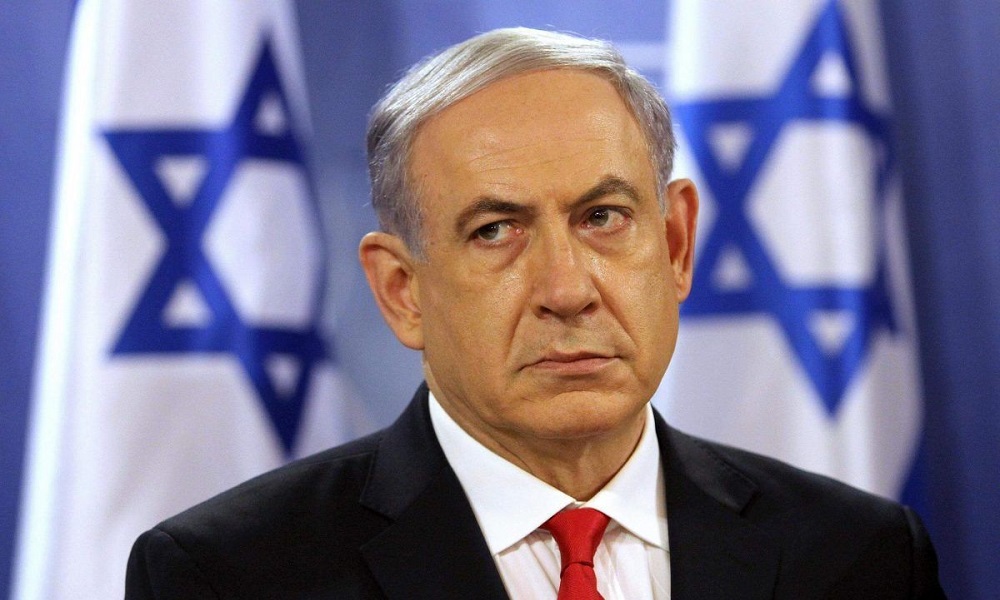
Judges at the International Criminal Court have issued arrest warrants for Israeli Prime Minister Benjamin Netanyahu and his former defence chief, as well as a Hamas leader, Ibrahim Al-Masri, for alleged war crimes and crimes against humanity, Reuters reported on Thursday afternoon.
The move comes after the ICC prosecutor Karim Khan announced on May 20, that he was seeking arrest warrants for alleged crimes connected to the Oct.7, 2023 attacks on Israel by Hamas and the Israeli military response in Gaza.
The ICC said Israel's acceptance of the court's jurisdiction was not required.
Israel has rejected the jurisdiction of the Hague-based court and denies war crimes in Gaza.
Israel has said it killed Al-Masri, also known as Mohammed Deif, in an airstrike but Hamas has neither confirmed nor denied this.
World
US vetoes UN Security Council resolution on Gaza ceasefire

The United States on Wednesday vetoed a U.N. Security Council resolution for a ceasefire in Gaza, drawing criticism of the Biden administration for once again blocking international action aimed at halting Israel's war with Hamas.
The 15-member council voted on a resolution put forward by 10 non-permanent members that called for an "immediate, unconditional and permanent ceasefire" in the 13-month conflict and separately demanded the release of hostages, Reuters reported.
Only the U.S. voted against, using its veto as a permanent council member to block the resolution.
Robert Wood, deputy U.S. ambassador to the U.N., said Washington had made clear it would only support a resolution that explicitly calls for the immediate release of hostages as part of a ceasefire.
"A durable end to the war must come with the release of the hostages. These two urgent goals are inextricably linked. This resolution abandoned that necessity, and for that reason, the United States could not support it," he said.
Wood said the U.S. had sought compromise, but the text of the proposed resolution would have sent a "dangerous message" to Hamas that "there's no need to come back to the negotiating table."
Israel's campaign in Gaza has killed nearly 44,000 people and displaced nearly all the enclave's population at least once. It was launched in response to an attack by Hamas-led fighters who killed 1,200 people and captured more than 250 hostages in Israel on Oct. 7, 2023.
Members roundly criticized the U.S. for blocking the resolution put forward by the council's 10 elected members: Algeria, Ecuador, Guyana, Japan, Malta, Mozambique, South Korea, Sierra Leone, Slovenia and Switzerland.
"It is deeply regretted that due to the use of the veto this council has once again failed to uphold its responsibility to maintain international peace and security," Malta's U.N. Ambassador Vanessa Frazier said after the vote failed, adding that the text of the resolution "was by no means a maximalist one."
"It represented the bare minimum of what is needed to begin to address the desperate situation on the ground," she said.
Food security experts have warned that famine is imminent among Gaza's 2.3 million people.
U.S. President Joe Biden, who leaves office on Jan. 20, has offered Israel strong diplomatic backing and continued to provide arms for the war, while trying unsuccessfully to broker a ceasefire deal between Israel and Hamas that would see hostages released in exchange for Palestinians held by Israel.
After blocking earlier resolutions on Gaza, Washington in March abstained from a vote that allowed a resolution to pass demanding an immediate ceasefire.
A senior U.S. official, who briefed reporters on condition of anonymity ahead of Wednesday's vote, said Britain had put forward new language that the U.S. would have supported as a compromise, but that was rejected by the elected members.
Some members were more interested in bringing about a U.S. veto than compromising on the resolution, the official said, accusing U.S. adversaries Russia and China of encouraging those members.
'GREEN LIGHT'
France's ambassador Nicolas de Riviere said the resolution rejected by the U.S. "very firmly" required the release of hostages.
"France still has two hostages in Gaza, and we deeply regret that the Security Council was not able to formulate this demand," he said.
China's U.N. ambassador, Fu Cong, said each time the United States had exercised its veto to protect Israel, the number of people killed in Gaza had steadily risen.
"How many more people have to die before they wake up from their pretend slumber?" he asked.
"Insistence on setting a precondition for ceasefire is tantamount to giving the green light to continue the war and condoning the continued killing."
Israel's U.N. ambassador Danny Danon said ahead of the vote the text was not a resolution for peace but was "a resolution for appeasement" of Hamas.
"History will remember who stood with the hostages and who abandoned them," Danon said.
-

 Sport5 days ago
Sport5 days agoAbu Dhabi’s thrilling T10 tournament just days away
-

 World5 days ago
World5 days agoBiden allows Ukraine to use US arms to strike inside Russia
-

 Sport4 days ago
Sport4 days agoAfghanistan beat UAE by 169 runs in U19 tri-series
-

 Latest News3 days ago
Latest News3 days agoTajikistan trumps Afghanistan 3-1 in football friendly
-
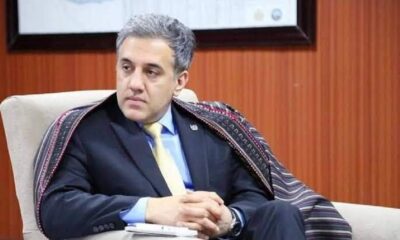
 Latest News4 days ago
Latest News4 days agoTwo Afghan diplomats posted to Germany under former government resign
-
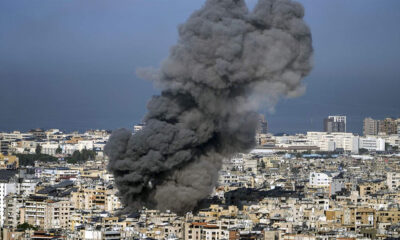
 World4 days ago
World4 days agoLebanon, Hezbollah agree to US proposal for ceasefire with Israel, Lebanese official says
-
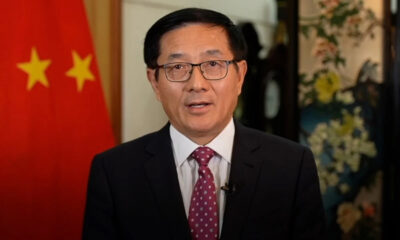
 Latest News4 days ago
Latest News4 days agoChina’s envoy says Beijing never interferes in Afghanistan’s internal affairs
-

 Latest News3 days ago
Latest News3 days agoEU marks International Children’s Day, says it supports Afghan children


